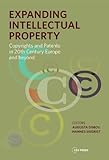Expanding Intellectual Property : Copyrights and Patents in 20th Century Europe and beyond / ed. by Hannes Siegrist, Augusta Dimou.
Material type: TextSeries: Leipzig Studies on the History and Culture of East-Central EuropePublisher: Budapest ; New York : Central European University Press, [2017]Copyright date: 2017Description: 1 online resource (324 p.)Content type:
TextSeries: Leipzig Studies on the History and Culture of East-Central EuropePublisher: Budapest ; New York : Central European University Press, [2017]Copyright date: 2017Description: 1 online resource (324 p.)Content type: - 9789633861868
- 346.404/8 23
- KJC2636
- online - DeGruyter
| Item type | Current library | Call number | URL | Status | Notes | Barcode | |
|---|---|---|---|---|---|---|---|
 eBook
eBook
|
Biblioteca "Angelicum" Pont. Univ. S.Tommaso d'Aquino Nuvola online | online - DeGruyter (Browse shelf(Opens below)) | Online access | Not for loan (Accesso limitato) | Accesso per gli utenti autorizzati / Access for authorized users | (dgr)9789633861868 |
Frontmatter -- Contents -- Acknowledgements -- Introduction -- I. The Institutionalization of Intellectual Property Rights between National and International Contexts -- 1. Intellectual Property Rights and the Dynamics of Propertization, Nationalization, and Globalization in Modern Cultures and Economies -- 2. Power and Development: The Revision Conferences of 1967 and 1971 of the Berne Convention and the Universal Copyright Convention -- 3. Legal Designs: Danish Designers as Court-Appointed Experts and the Expansion of the Concept of Copyright -- 4. Intellectual Property and Competition Policy: Patent Pooling and Industrial Concentration in Germany (1890–1930) -- 5. The Melting Pot of Copyright Law: Urheberrecht in Jerusalem -- 6. “Aryanization” Expanded? Patent Rights of Jews under the Nazi Regime -- II. Socialism: Copyright between System and Defiance -- 7. Copyright in the German Democratic Republic and the International Copyright Regime -- 8. From State Governance to Self-Management: Culture and Intellectual Property Rights in Communist Yugoslavia -- 9. Samizdat, Copyright, and the State: Copyright as Censorship and the Differences between East and West -- III. Postsocialism: Renegotiating Copyright Norms in Europe -- 10. The Influence of EU Copyright Harmonization Directives on the Construction of Postsocialist Copyright Law in Central and Eastern Europe -- 11. A New Concept in an Old Context: The Legal Framework of the Transformation of Intellectual Property in Macedonia after the Dissolution of Yugoslavia -- 12. Opposing the Expansion of Copyright Law: Social Norms in the Quest against ACTA and the “Commodification of Knowledge and Culture Project" -- List of Contributors -- Index
restricted access online access with authorization star
http://purl.org/coar/access_right/c_16ec
The book deals with the expansion and institutionalization of intellectual property norms in the twentieth century, with a European focus. Its thirteen chapters revolve around the transfer, adaptation and the ambivalence of legal transplants in the interface between national and international projects, trends and contexts. The first part discusses the institutionalization of copyright and patent law in the frame- work of the bigger political and economic projects of the twentieth century. The second and third parts of the collection review relevant processes in the communist regimes and the post-communist societies, respectively. The essays point at processes of enculturation, trans-nationalization and universalization of norms, as well as practices of incorporation and resistance. The contributors lay a particular emphasis on the role and activity of social actors in the establishment and validation of intellectual property norms and regimes, from the function of experts and creation of expert cultures to the compelling power of popular street protests.
Mode of access: Internet via World Wide Web.
In English.
Description based on online resource; title from PDF title page (publisher's Web site, viewed 20. Nov 2024)


